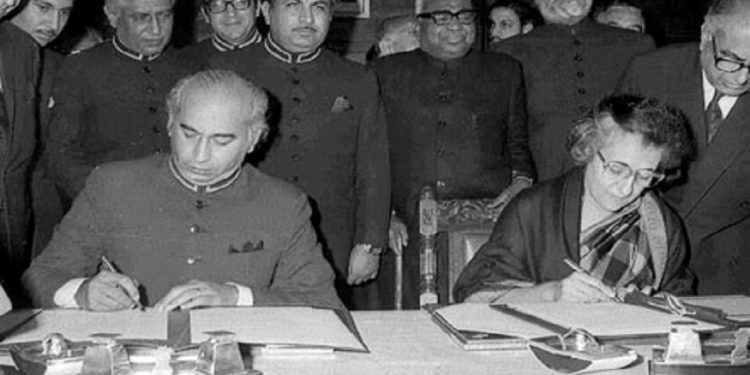Washington: The US has said it supports a direct dialogue between India and Pakistan as outlined in the Shimla Agreement, asserting that the “chief obstacle” to talks remain Islamabad’s continued support to extremist groups that engage in cross-border terrorism.
“We believe that direct dialogue between India and Pakistan, as outlined in the 1972 Shimla Agreement, holds the most potential for reducing tensions,” Acting Assistant Secretary of State for South and Central Asia Alice G Wells told Subcommittee on Asia, the Pacific, and Nonproliferation of the House Foreign Affairs Committee.
She said during 2006-2007 backchannel negotiations, India and Pakistan reportedly made significant progress on a number of issues, including Kashmir.
“History shows us what is possible,” Wells said Monday in a prepared statement submitted to the Congressional subcommittee on the eve of the hearing “Human Rights in South Asia: Views from the State Department and the Region”.
“Restarting a productive bilateral dialogue requires building trust, and the chief obstacle remains Pakistan’s continued support for extremist groups that engage in cross-border terrorism,” she said.
The United States, Wells said, welcomes Prime Minister Imran Khan’s recent unambiguous statement that terrorists from Pakistan who carry out violence in Kashmir are enemies of both Kashmiris and Pakistan.
“Pakistan’s harbouring of terrorist groups like Lashkar-e-Taiba and Jaish-e-Muhammed, which seek to foment violence across the Line of Control, is destabilising, and Pakistani authorities remain accountable for their actions,” she said in a warning to Pakistan.
“We believe the foundation of any successful dialogue between India and Pakistan is based on Pakistan taking sustained and irreversible steps against militants and terrorists in its territory,” Wells said.
Both President Donald Trump and Secretary of State Mike Pompeo have met and spoken with their Indian and Pakistani counterparts multiple times, including at the recent United Nations General Assembly, to encourage dialogue, she told the lawmakers in the prepared statement.
Observing that the security situation in Kashmir remains tense, Wells said clashes between youth and security forces are a regular occurrence, and Indian forces killed suspected terrorists in multiple firefights last week.
“We are concerned about reports of local and foreign militants attempting to intimidate local residents and business owners in order to stymie normal economic activity. The United States supports the rights of Kashmiris to peacefully protest, but condemns the actions of terrorists who seek to use violence and fear to undermine dialogue,” she said.
Meanwhile, incidents of violence and discrimination against minorities, including attacks on Dalits and Muslims by cow vigilantes, are not in keeping with India’s legal protections for minorities, a top US diplomat told a Congressional subcommittee.
Noting that the US is proud to partner with India, Wells said its Constitution mandates a secular state that upholds the rights of all citizens to practice religion freely, freedom of expression and speech, and equal treatment before the law.
“Incidents of violence and discrimination against minorities in India, including cow vigilante attacks against members of the Dalit and Muslim communities, and the existence of anti-conversion laws in nine states are not in keeping with India’s legal protections for minorities,” Wells told Subcommittee on Asia, the Pacific, and Nonproliferation of the House Foreign Affairs Committee.
She said the US calls upon the Indian government to “fully” uphold the universal right to religious freedom and protect vulnerable individuals,” including the 1.9 million people in Assam at risk for statelessness because of questions about their citizenship; condemn all incidents of violence; and hold perpetrators accountable.”
Last May, 68 per cent of eligible Indian voters went to the polls for an historic election, Wells said, adding Indians of every religion, caste, sect, and socio-economic background participated in the remarkable display of parliamentary democracy, which also witnessed a record turnout of women voters.
“India’s robust civil society and democratic institutions are all the more remarkable given its immense size and the challenges it faces in terms of development,” she said Monday.
These include India’s overwhelmed and understaffed court system and its unique federal structure that at times complicates policing and governance. With more than a quarter of the population living at or below the poverty line, local governments often struggle with competing priorities, she added.
Observing that India is a vigorous democracy that enjoys a strong and growing strategic partnership with the United States, Wells said that New Delhi-US relationship is broad in scope and multifaceted.
“As with every country, we engage with India on issues of human rights and religious freedom. We also press India for progress on parental child abduction, consistent with the priority we place on safeguarding the welfare of US citizens abroad, including children,” she said in a prepared statement submitted to the Congressional subcommittee on the eve of the hearing “Human Rights in South Asia: Views from the State Department and the Region.”
India is the birthplace of four major world religions — Hinduism, Sikhism, Buddhism, and Jainism. It is home to the world’s third largest Muslim population, a diverse community of sects that includes Sufis, Shia, and Bohra. Roughly three per cent of India’s citizens are Christian, and notably, Christians are the religious majority in three of India’s 29 states, she said.
“India has a proud history with the Jewish faith — the oldest synagogue in the country dates to 1568. We also appreciate India’s longstanding support for Tibetan refugees and the Dalai Lama. Adding to this diverse mosaic are India’s many regional and linguistic communities. Indeed, on every Indian rupee note the denomination value is printed in 15 different languages — a remarkable display of India’s rich diversity,” Wells said.







































